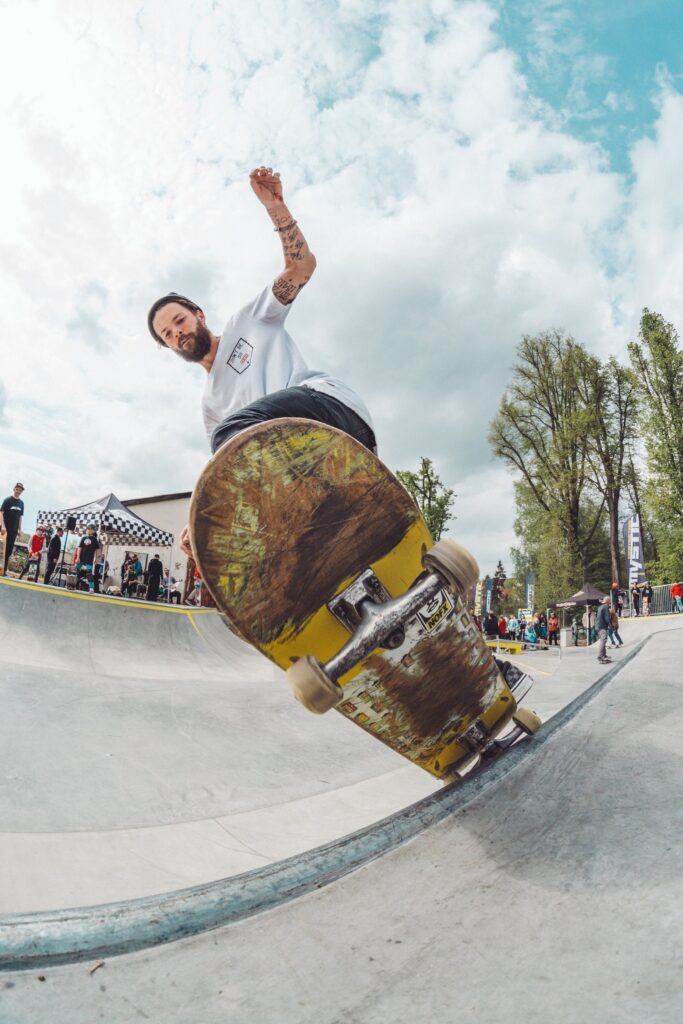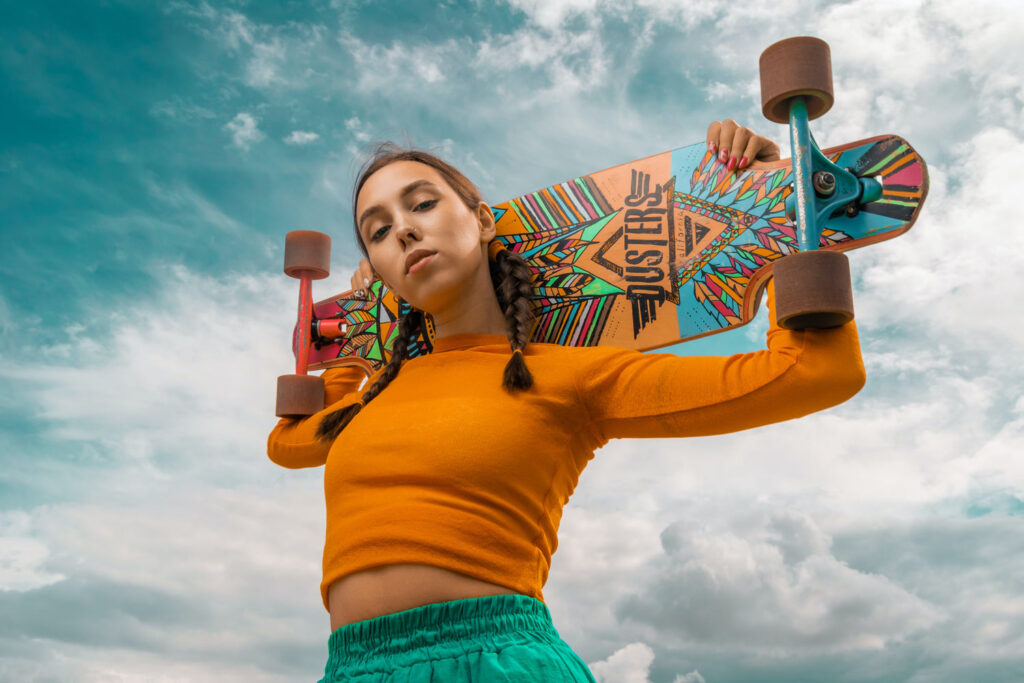No, it is highly unlikely that anyone can learn skateboarding in just one day. It takes time and practice to develop the necessary skills and balance required to ride a skateboard successfully.
Skateboarding is an exciting and popular sport that requires a lot of patience and dedication. While some people may pick up skateboarding faster than others, it is unlikely that anyone can master this skill within a day. Skateboarding involves learning how to balance on a board while navigating different surfaces, such as concrete, wood, or asphalt. It also involves learning how to perform tricks, such as jumps and grinds. Mastering all of these skills takes time, effort, and a lot of practice. Nevertheless, with consistent practice and dedication, anyone can learn how to skateboard, no matter their age or skill level.

Credit: stokedrideshop.com
Understanding Skateboarding
Skateboarding has become a popular pastime for many people globally. However, some individuals are often curious about whether it’s possible to learn skateboarding in a day. The answer is not a simple yes or no. It’s possible to pick up some basics, but it takes time and practice to become an expert.
Understanding skateboarding involves learning the fundamentals, equipment, and different styles.
Discuss The Basics Of Skateboarding (Stance, Balance, Pushing)
Before trying to do any tricks, one has to learn basic stance, balance, and pushing. These three essentials will enable you to move around on your skateboard.
- Your front foot should be perpendicular to the board, toes pointing straight ahead, while your back foot should be parallel to the tail, toes hanging slightly over the edge
- Bend your knees to maintain balance
- Push the board with your back foot until it picks up momentum
- Place your feet in the correct position on the board to allow for maneuverability
Explain The Equipment Needed For Skateboarding (Board, Shoes, Protective Gear)
Besides learning the basics of skateboarding, one needs proper equipment for safety and a better chance of progression.
- Skateboard – select the right size for your weight, height, and purpose of use
- Shoes – get skateboarding shoes, with flat, sticky sole and support
- Protective gear – include safety apparel like helmets, elbow pads, and knee pads.
Introduce Different Skateboarding Styles (Street, Vert, Freestyle)
There are a variety of skateboarding styles to choose from and here are the three main categories:
- Street – mostly involves urban-style skateboarding, performing tricks on obstacles like stairs, rails, and curbs.
- Vert – focuses on tricks that are performed on a half-pipe, bowl, or other similar structures.
- Freestyle – involves tricks done in an open space or flat ground, with no obstacles.
Although it’s not easy to become an expert in skateboarding in just one day, understanding the basic stance, balance, and pushing is crucial for any form of skateboarding. Additionally, getting the right equipment and choosing your desired style will help in making the experience more enjoyable.
Have fun and always remember safety first!
Challenges Of Learning Skateboarding
Skateboarding is a popular recreational activity that requires a combination of physical and mental skills. The thought of learning skateboarding within a day might seem like a far-fetched idea to many. Despite having some basic considerations and few hours of practice, learning how to skate is achievable.
However, there are different challenges that one can encounter while learning skateboarding, which can vary from physical to mental difficulties. In this article, we explore the challenges of learning skateboarding and how to tackle them effectively.
Discuss The Physical Challenges Of Skateboarding
Skateboarding requires specific physical abilities that may take time to develop.
- Balance: balancing while standing on a skateboard requires developing muscle strength, coordination and stability.
- Coordination: skateboarders must learn how to coordinate their body movements in a way that ensures they maintain balance on the board.
- Muscle memory: learning different skateboard tricks requires developing muscle memory by repeating the same movements over and over again.
Explain The Mental Challenges
Skateboarding is as much a mental game as it is a physical one. In addition to the physical challenges mentioned earlier, there are also psychological challenges that beginners may face.
- Fear: fear of falling can make it difficult to push oneself out of their comfort zone while learning how to skateboard.
- Frustration: skateboarding can be frustrating, and mastering certain moves can take many hours of practice. It’s important to have patience and keep trying.
- Patience: it can take time to build up the foundational skills needed to become a skilled skateboarder. Patience is key when learning how to skateboard.
Share Personal Accounts From Experienced Skateboarders
Experienced skateboarders can attest to the difficulties that come with learning how to skate. However, with persistence, the physical and mental challenges that come with skateboard learning can be tackled.
- Sarah: “when i started skateboarding, balancing on the board was the most difficult part. I kept practicing until i found my center of gravity, and my balance improved. Now, i can maneuver around obstacles and perform different skateboard tricks.
- Mike: “fear is the biggest challenge when learning how to skate. When i fell a couple of times, i became scared of trying certain moves. I started slowly, working on my balance and speed until i felt more comfortable on the board.
- Joseph: “the mental challenge while learning to skateboard is immense. When i first started, i found it frustrating when i couldn’t get a move right. I had to be patient and remind myself that the best skateboarders have put in countless hours of practice.
Learning how to skateboard within a day may be impossible for most people. However, with the right mindset and practice, it’s possible to overcome the physical and mental challenges that come with skateboarding. By following the tips shared in this article and learning from experienced skateboarders, you can develop the skills required to become a skilled skateboarder.
10 Things To Learn Your FIRST WEEK Skateboarding 🛹
Steps To Learning Skateboarding
Skateboarding can be an exciting way to express yourself while staying active, but can you learn it in just one day? While you may not become a pro overnight, with the right mindset and approach, you can definitely make progress towards mastering the basics.
Begin With The Basics (Stance, Balance, Pushing)
Before you start trying any advanced moves, it’s important to get comfortable with the fundamentals of skateboarding. This includes developing a proper stance, which involves keeping your feet perpendicular to the board and your shoulders aligned with the deck. To maintain balance on the board, practice shifting your weight back and forth while standing still on it.
Then, begin pushing off with your back foot to gain momentum and start moving.
Some recommended drills and exercises for getting comfortable with the basics of skateboarding include:
- Practice standing on the board and shifting your weight from one foot to the other while keeping the board stationary.
- Start by pushing off and riding in a straight line, focusing on maintaining your balance and keeping your body centered over the board.
- Once you feel comfortable moving forward, practice stopping by dragging your back foot along the ground.
- Try riding over small obstacles like cracks or bumps in the ground to build confidence and improve your balance.
Introduce Turning And Stopping Techniques
Once you’ve gotten comfortable with the basics, the next step is to learn how to control your board by turning and stopping. To turn, lean your weight in the direction you want to go while keeping your body centered over the board.
To stop, either slow down gradually by pushing your back foot against the ground or come to a sudden stop by dragging your back foot.
Some recommended drills and exercises for improving your turning and stopping skills include:
- Practice making wide turns by leaning your weight in one direction and then the other.
- Gradually decrease your turning radius by leaning more sharply in each direction.
- Practice coming to a stop by dragging your back foot while moving at a moderate speed.
- Practice stopping suddenly by using your back foot to slam down on the tail of the board.
Progress To More Advanced Moves (Ollies, Kickflips, Grinds)
Once you’ve mastered the basics, you can start experimenting with more advanced moves like ollies, kickflips, and grinds. These tricks require a combination of timing, balance, and coordination, so don’t get discouraged if they take some time to master.
Some recommended drills and exercises for practicing advanced skateboarding moves include:
- Begin by practicing ollies, which involve using your back foot to pop the tail of the board, jumping with your front foot, and sliding your back foot forward to level out the board in the air.
- Once you’ve mastered ollies, try practicing kickflips, which involve the same jumping and sliding motion as ollies, but with the added challenge of flipping the board 360 degrees with your front foot.
- When you feel comfortable with these moves, you can start experimenting with grinds, which involve sliding the board along a rail or other obstacle, using the trucks and wheels to maintain balance.
With consistent practice and determination, you can learn how to skateboard like a pro, but it’s important to start with the basics and work your way up gradually. By following these essential steps and practicing regularly, you’ll be well on your way to becoming a skilled and confident skateboarder.
Can You Learn Skateboarding In A Day?
Are you wondering whether you can learn how to skateboard in just one day? Well, the truth is, it’s possible to learn the basics in a day, but mastering it takes time and dedication. In this article, we’ll explore whether it’s feasible to learn how to skate in a day and the benefits of continuing to practice and learn.
Discuss The Possibility Of Learning The Basics In A Day
Learning the basics of skateboarding in a day is certainly achievable, but it may require rigorous training and the right coaching.
- Skateboarding involves learning the proper stance, balance, and foot placement, which may take time to master.
- Understanding the basics of skateboarding, such as stopping, turning, and pushing, can be learned in a day.
- It’s advisable to take beginners’ classes or seek the guidance of an experienced skateboarder to have a strong foundation.
Address The Reality That Mastering Skateboarding Takes Time And Dedication
To become a skilled skateboarder, it takes more than just learning the basics in one day.
- Mastering the advanced techniques, such as ollies and flips, takes time, practice, and dedication.
- Skateboarding requires physical and mental fitness, coordination, and perseverance.
- Progressing in skateboarding involves lots of falls and failures, but that’s normal and part of the learning process.
Outline The Benefits Of Continuing To Practice And Learn Skateboarding
Continuing to learn and practice skateboarding can be rewarding in many ways.
- Skateboarding is an excellent way to improve physical health and overall fitness level.
- It provides a social and fun way to meet and connect with other skateboarders and enthusiasts.
- Skateboarding can boost confidence, creativity, and self-expression.
- There are plenty of opportunities to compete in skateboarding events and to showcase your skills.
While you can learn the basics of skateboarding in a day, mastering it takes time and dedication. The benefits of continuing to practice and learn are numerous, including physical fitness, social connections, and personal growth. So, grab your skateboard, find a coach, and have fun on your journey!
Conclusion
Learning to skateboard in a day is ambitious but unrealistic. Skateboarding requires consistent practice, patience, and dedication. While some individuals may have natural talent, it still takes time to develop the required skills and techniques. Don’t get discouraged if you can’t master skateboarding in a day.
Instead, focus on taking small steps, such as learning to balance on the board or mastering basic maneuvers. With time and effort, you’ll eventually progress and reach your goals. Additionally, it’s important to practice safety when learning to skateboard. Always wear appropriate protective gear and start with the basics.
Combine passion and practice; that’s the recipe for success. Ultimately, the journey to learning how to skateboard is fulfilling, and the rewards of improving your skills are endless. With perseverance and patience, anyone can learn to skate.



